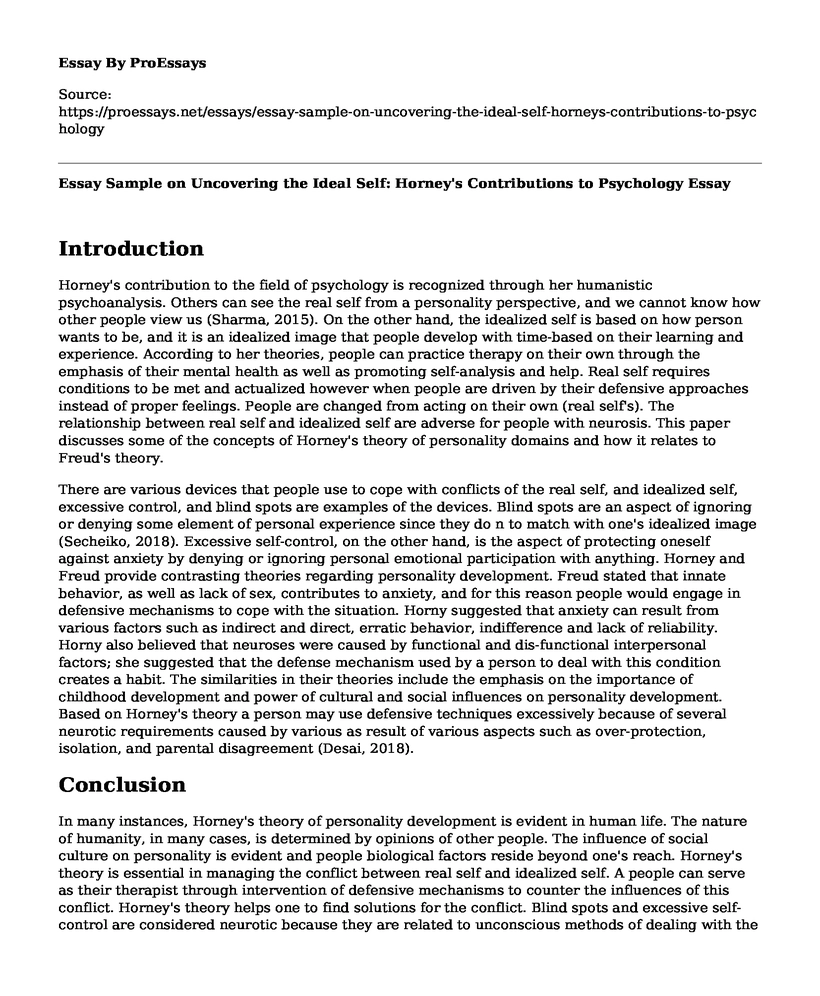Introduction
Horney's contribution to the field of psychology is recognized through her humanistic psychoanalysis. Others can see the real self from a personality perspective, and we cannot know how other people view us (Sharma, 2015). On the other hand, the idealized self is based on how person wants to be, and it is an idealized image that people develop with time-based on their learning and experience. According to her theories, people can practice therapy on their own through the emphasis of their mental health as well as promoting self-analysis and help. Real self requires conditions to be met and actualized however when people are driven by their defensive approaches instead of proper feelings. People are changed from acting on their own (real self's). The relationship between real self and idealized self are adverse for people with neurosis. This paper discusses some of the concepts of Horney's theory of personality domains and how it relates to Freud's theory.
There are various devices that people use to cope with conflicts of the real self, and idealized self, excessive control, and blind spots are examples of the devices. Blind spots are an aspect of ignoring or denying some element of personal experience since they do n to match with one's idealized image (Secheiko, 2018). Excessive self-control, on the other hand, is the aspect of protecting oneself against anxiety by denying or ignoring personal emotional participation with anything. Horney and Freud provide contrasting theories regarding personality development. Freud stated that innate behavior, as well as lack of sex, contributes to anxiety, and for this reason people would engage in defensive mechanisms to cope with the situation. Horny suggested that anxiety can result from various factors such as indirect and direct, erratic behavior, indifference and lack of reliability. Horny also believed that neuroses were caused by functional and dis-functional interpersonal factors; she suggested that the defense mechanism used by a person to deal with this condition creates a habit. The similarities in their theories include the emphasis on the importance of childhood development and power of cultural and social influences on personality development. Based on Horney's theory a person may use defensive techniques excessively because of several neurotic requirements caused by various as result of various aspects such as over-protection, isolation, and parental disagreement (Desai, 2018).
Conclusion
In many instances, Horney's theory of personality development is evident in human life. The nature of humanity, in many cases, is determined by opinions of other people. The influence of social culture on personality is evident and people biological factors reside beyond one's reach. Horney's theory is essential in managing the conflict between real self and idealized self. A people can serve as their therapist through intervention of defensive mechanisms to counter the influences of this conflict. Horney's theory helps one to find solutions for the conflict. Blind spots and excessive self-control are considered neurotic because they are related to unconscious methods of dealing with the conflicts of real self and idealized self.
References
Desai, M. (2018). Travel and Movement in History: Frantz Fanon, Karen Horney, and Erich Fromm. In Travel and Movement in Clinical Psychology (pp. 27-63). Palgrave Macmillan, London.
Secheiko, O. (2018). Intrapersonal conflicts of bloggers: psychological perspective. Current problems of psychiatry, 19(1), 9-14.
Sharma, B. B. (2015). Behavioural ramifications in rejection sensitivity: Revisiting Horney's theory of the neurotic personality. International Journal of Education and Management Studies, 5(2), 164.
Cite this page
Essay Sample on Uncovering the Ideal Self: Horney's Contributions to Psychology. (2023, Feb 12). Retrieved from https://proessays.net/essays/essay-sample-on-uncovering-the-ideal-self-horneys-contributions-to-psychology
If you are the original author of this essay and no longer wish to have it published on the ProEssays website, please click below to request its removal:
- Research Paper on Engaging Parents With Children
- Paper Example on Celebrating Milly Ambrose: A Tribute to a Beloved Grandmother
- Adolescence & TDV: Monitoring Children in a Vulnerable Period - Essay Sample
- Essay Example on the Complex Function of Memory: How it Shapes Us and Our Interactions
- Essay Sample on 'Beauty Standards': A Bane for Women's Mental and Physical Health
- Exploring Identity: Adolescents Searching for Peer Approval - Essay Sample
- Paper Sample on Nursing Burnout: Argument Against Overtime







